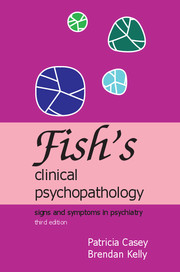Book contents
- Frontmatter
- Contents
- The authors
- Preface
- 1 Classification of psychiatric disorders
- 2 Disorders of perception
- 3 Disorders of thought and speech
- 4 Disorders of memory
- 5 Disorders of emotion
- 6 Disorders of the experience of self
- 7 Disorders of consciousness
- 8 Motor disorders
- 9 Personality disorders
- Appendix I Psychiatric syndromes
- Appendix II Defences and distortions
- Index
6 - Disorders of the experience of self
Published online by Cambridge University Press: 15 February 2018
- Frontmatter
- Contents
- The authors
- Preface
- 1 Classification of psychiatric disorders
- 2 Disorders of perception
- 3 Disorders of thought and speech
- 4 Disorders of memory
- 5 Disorders of emotion
- 6 Disorders of the experience of self
- 7 Disorders of consciousness
- 8 Motor disorders
- 9 Personality disorders
- Appendix I Psychiatric syndromes
- Appendix II Defences and distortions
- Index
Summary
Recent decades have seen a revival of interest in the study of the self, selfawareness and various changes in self-awareness, especially in the context of mental illnesses such as schizophrenia (Sass & Parnas, 2003; Harland et al, 2004). Although there is a substantial German literature on Ichbewusstsein or ego consciousness, both of these terms have now been replaced by the term ‘self-experience.’ Jaspers (1997) has pointed out that there are four aspects of self-experience, the awareness of:
• existence and activity of the self
• being a unity at any given point in time
• continuity of identity over a period of time
• being separate from the environment (or, in other words, awareness of ego boundaries).
It is possible to discuss disorders of self-awareness under these four headings, but a number of other symptoms can be regarded as disturbances in two of these aspects of self-experience: awareness of existence and activity of the self and awareness of being separate from the environment.
Disturbance of awareness of self-activity
All events that can be brought into consciousness are associated with a sense of personal possession, although this is not usually in the forefront of consciousness. This ‘I’ quality has been called personalisation (Jaspers, 1997) and may be disturbed in psychological disorders. There are two aspects to the sense of self-activity: the sense of existence and the awareness of the performance of one's actions.
Depersonalisation
A change in the awareness of one's own activity occurs when the patient feels that they are no longer their normal natural self and this is known as ‘depersonalisation’. Often this is associated with a feeling of unreality so that the environment is experienced as flat, dull and unreal. This aspect of the symptom is known as ‘derealisation’. The feeling of unreality is the core of this symptom, and it is always, to a greater or lesser extent, an unpleasant experience; which distinguishes it from ecstatic states.
When the patient first experiences the symptom they are likely to find it very frightening and often think it is a sign that they are going mad. In the course of time they may become more or less accustomed to it. Many patients who complain of depersonalisation also state that their capacity for feeling is diminished or absent.
- Type
- Chapter
- Information
- Fish's Clinical PsychopathologySigns and Symptoms in Psychiatry, pp. 75 - 80Publisher: Royal College of PsychiatristsPrint publication year: 2007



